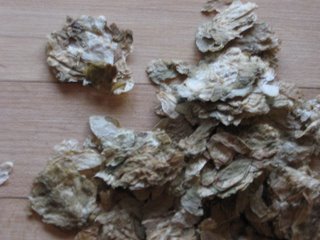
My House Stinks
Normally, this would be a bad thing, like in a fit of the blues I refused to take the garbage out for what smelled like forever.
But in truth I am starting the Spontaneous Barm. The hops are simmering on the stove, emitting a brewery kind of smell that would soak into the curtains if I had any. This is going to take four non-labour intensive days to make.
I found my hops in a health food store. There are umpteen types of hops to be found online. I have only used one type so far. In the brewing of beer the type of hop one uses is very important for flavour in the finished product. I’m not sure just how important it would be in a loaf of bread.
My inspiration for making breads without commercial yeast came from this letter, written in 1834 by an early Canadian settler.
In front of the stoup, where we dined, the garden was laid out with a smooth plot of grass, surrounded with borders of flowers, and separated from a ripening field of wheat by a light railed fence, over which the luxuriant hopvine flung its tendrils and graceful blossoms. Now I must tell you the hop is cultivated for the purpose of making barm, for raising bread. As you take great interest in housewifery concerns, I shall send you a recipe for what we call hop-rising.
Here is an excerpt for what Elizabeth David would call a Spontaneous Barm from a letter written by “the wife of an Emigrant Officer, 1838”, (Canada).
In every settlers house is a valuable substitute for ale or beer yeast, and it is make in the following manner:- take two double handfuls of hops, boil in a gallon of soft water, if you can get it, till the hops sink to the bottom of the vessel; make ready a batter formed by stirring a dessert plate full of flour and cold water till smooth and pretty thick together: strain the hop liquor while scalding hot into the vessel where your batter is mixed ready: let one person pour the hop liquor while the other keeps stirring the batter. When cooled down to a gentle warmth, so that you can bear the finger well into it, add a cup or basinful of the former barm, or a bit of leaven to set it to work; let the barm stand till it has worked well, then bottle and cork it. Set by a cellar or cool place in summer, and in winter it is best to keep it from freezing. Some persons add two or three mealy potatoes boiled and finely bruised, and it is a great improvement in the cooler months of the year. Potatoes in bread may be introduced very advantageously; and to the first settlers, who have all their flour to buy, I think it must be a saving.
The recipe I post tomorrow is a one person job of much smaller dimensions.

3 Comments:
Wow, fascinating stuff. Hope your house returns to its more normal smell soon!
I love the book you are quoting from, it's so fun to read a diary that was written so long ago.
Yes, I love the extracts from the book too. Also noticed last year that we have hops growing at the back of the garden over the hen house - do you think they're the right sort?
Post a Comment
<< Home